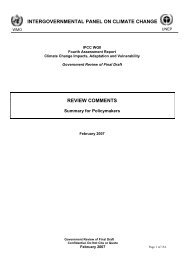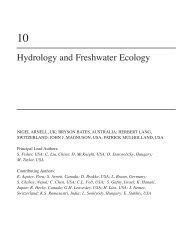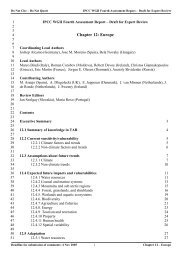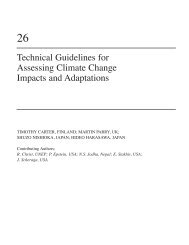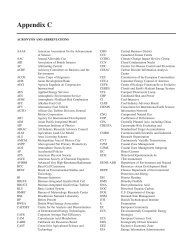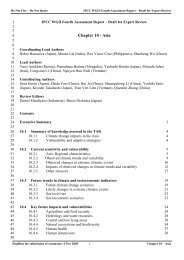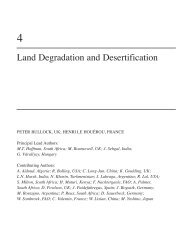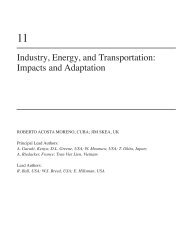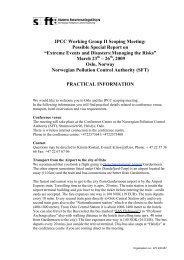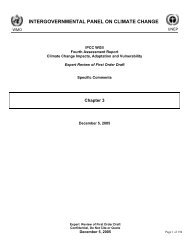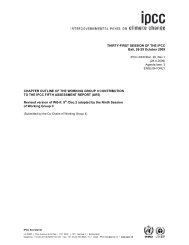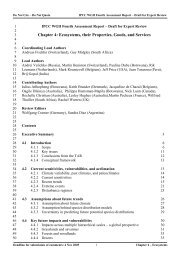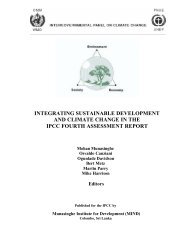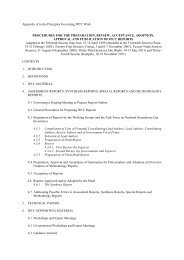IPCC Expert Meeting on Geoengineering
IPCC Expert Meeting on Geoengineering
IPCC Expert Meeting on Geoengineering
You also want an ePaper? Increase the reach of your titles
YUMPU automatically turns print PDFs into web optimized ePapers that Google loves.
Annex 3: Keynote Abstracts<br />
Keynote III-2: Internati<strong>on</strong>al Cooperati<strong>on</strong> and the Governance of <strong>Geoengineering</strong><br />
Arunabha Ghosh<br />
Chief Executive Officer, Council <strong>on</strong> Energy, Envir<strong>on</strong>ment and Water, India<br />
The case for the internati<strong>on</strong>al governance of geoengineering is unclear for several reas<strong>on</strong>s: why governance is needed;<br />
what to govern; how widely would internati<strong>on</strong>al governance work. This presentati<strong>on</strong> asks: If geoengineering were to be<br />
governed at the internati<strong>on</strong>al level, what would be the underlying motivati<strong>on</strong>s and what forms could such governance<br />
take? The purpose is two-fold: to inquire into the explicit and implicit c<strong>on</strong>cerns and interests that motivate countries to<br />
demand or oppose internati<strong>on</strong>al governance; and sec<strong>on</strong>dly, to inquire into the functi<strong>on</strong>al forms that internati<strong>on</strong>al<br />
governance could take depending <strong>on</strong> varied motivati<strong>on</strong>s. Not <strong>on</strong>ly is internati<strong>on</strong>al cooperati<strong>on</strong> <strong>on</strong> geoengineering not a<br />
given; its design and effectiveness would depend <strong>on</strong> the ultimate goals for promoting governance at the internati<strong>on</strong>al level.<br />
Why govern?<br />
Demands for governing geoengineering derive from a mix of interests and ethical c<strong>on</strong>cerns. On interests, states are<br />
motivated by at least two competing pressures, both stemming from uncertainty over the science of geoengineering.<br />
Without further research, the state of knowledge <strong>on</strong> geoengineering will not be robust enough for policymakers to make<br />
informed decisi<strong>on</strong>s. An individual country might want to retain the freedom to experiment with geoengineering<br />
technologies, so that its scientific community may build an advanced knowledge base <strong>on</strong> yet unproven technologies.<br />
Viewed in this way, internati<strong>on</strong>al rules could be c<strong>on</strong>sidered ‘status quo-ist’, a c<strong>on</strong>straint <strong>on</strong> a single country’s freedom of<br />
manoeuvre in future. But uncertainties associated with geoengineering also mean that the acti<strong>on</strong>s of other countries might<br />
have unforeseen c<strong>on</strong>sequences. Could geoengineering offer a technological edge to some countries? Could deployment of<br />
certain techniques outside <strong>on</strong>e’s borders adversely affect weather patterns within <strong>on</strong>e’s territory? With the current state of<br />
knowledge, it is hard to answer such questi<strong>on</strong>s with certainty. Viewed in this way, internati<strong>on</strong>al rules could be c<strong>on</strong>sidered a<br />
useful tool to rein in runaway, unilateral acti<strong>on</strong> in an uncertain technological field. Thus, countries would favour rules that<br />
offered them maximum flexibility while keeping other countries off balance. But the demand for rules also derives from<br />
ethical c<strong>on</strong>cerns. Countries (and/or their citizens) could seek governance over geoengineering technologies because they<br />
oppose interference with nature, or because they want to ascertain the intent behind research into these technologies, or<br />
simply because they claim a say over acti<strong>on</strong>s that have internati<strong>on</strong>al impact. Process-related c<strong>on</strong>cerns include: having the<br />
opportunity to participate in forums where rules might be drawn up, having the power to influence rules, and being<br />
sufficiently aware to offer informed c<strong>on</strong>sent or dissent. Outcome-related c<strong>on</strong>cerns include: capability to c<strong>on</strong>duct<br />
ge<strong>on</strong>engineering research and/or deployment; intenti<strong>on</strong>s and acti<strong>on</strong>s deriving from such capability; the manner in which<br />
acti<strong>on</strong>s are m<strong>on</strong>itored and reviewed; and how disputes are adjudicated and resolved.<br />
Why cooperate?<br />
Even the most powerful of countries need internati<strong>on</strong>al regimes at least under three c<strong>on</strong>diti<strong>on</strong>s: the lack of a framework<br />
establishing legal liability for state acti<strong>on</strong>s; positive transacti<strong>on</strong> costs; and imperfect informati<strong>on</strong>. The presentati<strong>on</strong> will<br />
distinguish between forms of internati<strong>on</strong>al cooperati<strong>on</strong> depending <strong>on</strong> the motivati<strong>on</strong>s of countries demanding governance<br />
arrangements. Cooperati<strong>on</strong> over scientific experiments would entail decisi<strong>on</strong>s about funding, building capacity,<br />
coordinating research, reviewing results, and ensuring transparency. Such cooperati<strong>on</strong> could bypass nati<strong>on</strong>al governments,<br />
at least for small scale or laboratory experiments. Internati<strong>on</strong>al cooperati<strong>on</strong> gets trickier when geoengineering research is<br />
not <strong>on</strong>ly funded from public resources but also where intenti<strong>on</strong>ality is hard to identify and resp<strong>on</strong>sibility is hard to attribute.<br />
Even if intenti<strong>on</strong>s were benign, some would argue that since geoengineering is a resp<strong>on</strong>se to climate change (an issue the<br />
burden of resp<strong>on</strong>sibility), the internati<strong>on</strong>al community should have a say in why and how it is researched and deployed.<br />
Whatever the motivati<strong>on</strong>, the case for internati<strong>on</strong>al cooperati<strong>on</strong> is based <strong>on</strong>: firstly, imperfect informati<strong>on</strong> about<br />
geoengineering activities, their intent and impact; and, sec<strong>on</strong>dly, the absence of a framework to establish legal liability over<br />
acti<strong>on</strong>s.<br />
Which functi<strong>on</strong>s for what motivati<strong>on</strong>s?<br />
It is unclear a priori what instituti<strong>on</strong>al form internati<strong>on</strong>al cooperati<strong>on</strong> would take in order to influence geoengineering<br />
activities. At least four opti<strong>on</strong>s may be identified: <strong>on</strong>e, nati<strong>on</strong>al-level governance; two, ad hoc codes of c<strong>on</strong>duct and<br />
principles developed by the scientific community; three, adapting the mandates of existing internati<strong>on</strong>al treaties, such as<br />
the C<strong>on</strong>venti<strong>on</strong> <strong>on</strong> L<strong>on</strong>g Range Transboundary Air Polluti<strong>on</strong>, the C<strong>on</strong>venti<strong>on</strong> <strong>on</strong> Biological Diversity and the C<strong>on</strong>venti<strong>on</strong> <strong>on</strong><br />
<str<strong>on</strong>g>IPCC</str<strong>on</strong>g> <str<strong>on</strong>g>Expert</str<strong>on</strong>g> <str<strong>on</strong>g>Meeting</str<strong>on</strong>g> <strong>on</strong> <strong>Geoengineering</strong> - 37



